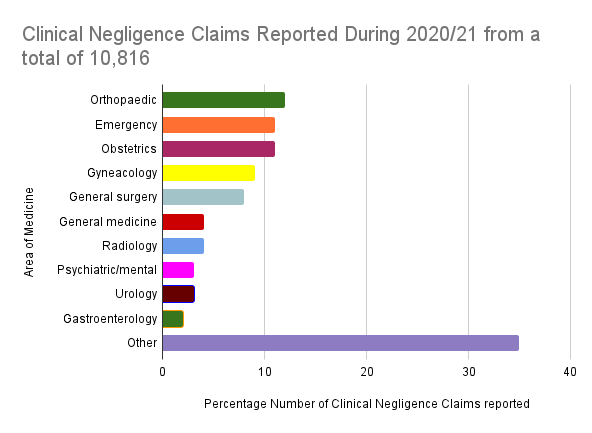By Stephen Parker. Last Updated 12th January 2023. This guide looks at how much you could claim in compensation for a medical misdiagnosis. We look at what could form the basis of a claim like this, and what steps you could take to make one, either independently or with a medical negligence solicitor working on your behalf.

Medical misdiagnosis claims guide
A misdiagnosis can be harmful to your health. It might result in your condition worsening past the point that it would have if you’d gotten the right level of care. This can make it more difficult to treat your illness.
All patients have a right to expect that the surgeon, doctor, or nurse treating them does not harm them unnecessarily and that they receive the correct level of care in accordance with medical standards. If either an NHS or private healthcare provider failed in this crucial regard, read on or get in touch to discuss your next step:
- Call our team for free on the number above
- Submit an online enquiry through our contact us page
- Access immediate help through the live support option
Choose A Section
- What Is A Medical Misdiagnosis?
- How Much Could I Get For A Medical Misdiagnosis?
- Examples Of How A Misdiagnosis Could Happen
- Medical Misdiagnosis Claim – How To Claim For Misdiagnosis
- What Are No Win No Fee Claims?
- Additional Information About A Medical Misdiagnosis Claims
What Is A Medical Misdiagnosis?
A medical misdiagnosis can be a form of negligent medical treatment. Medical negligence is when any qualified healthcare professional fails to deliver care of the minimum standards expected in that field of medicine. If you experience medical negligence, this could cause you harm.
Failing to have a healthcare concern properly diagnosed can cause numerous issues like scar damage, unnecessary pain, psychological upset, and even death. If the patient suffers direct harm like this because the right level of care was not administered, either they or their family (in the case of a fatal instance of medical negligence) can seek compensation for the harm caused.
We look at this topic in detail in the sections below. We explain what evidence you will need to start a successful claim and how to use medical and documented proof to properly calculate the damages you could be owed after a medical misdiagnosis.
If you’d like to ask any questions, our team of advisors are on hand and waiting to speak with you. If your claim is valid, you could be connected with a medical negligence solicitor from our panel.
Medical Misdiagnosis Statistics
NHS Resolution provides statistics that show, amongst other things, the areas of medicine that compensation claims relate to. The chart below is based on data taken from their Annual Report 2021. It shows the percentage of clinical negligence claims reported during 2020/21 that relate to certain areas of medicine. As you can see, orthopaedics was the area of medicine with the highest percentage of claims.
How Much Could I Get For A Medical Misdiagnosis?
In order to answer the question “how much compensation could I recieve?”, we need to look at the two different heads of claim that could make up your settlement. General damages is the part of your compensation that relates to the pain, suffering and loss of amenity that the injury causes.
The chart below offers guideline compensation brackets for general damages from a publication called the Judicial College Guidelines. This document is used to help value claims.
| Brain Injuries | How much? | Description |
|---|---|---|
| Brain Damage: Very Severe | £282,010 to £403,990 | Little or no meaningful response to environment and a need for constant care. |
| Brain Damage: Moderately Severe | £219,070 to £282,010 | The injured person will be very seriously disabled cognitively and/or physically. |
| Brain Damage: Moderate (i) | £150,110 to £219,070 | A moderate to severe intellectual deficit, an effect on eyesight, personality change and an effect on speech and senses. |
| Brain Damage: Moderate (ii) | £90,720 to £150,110 | A moderate to modest deficit to intellect, there is some risk of epilepsy and the injured person will have employment prospects that are greatly restricted or removed. |
| Brain Damage: Moderate (iii) | £43,060 to £90,720 | Affected memory or concentration, there is a risk of epilepsy and the ability to work is reduced. |
| Total Blindness | In the region of £268,720 | Complete loss of sight |
| Total Deafness | £90,750 to £109,650 | The lower end of the bracket will be appropriate where there is no tinnitus or noise induced hearing loss |
| Lung Disease (c) | £54,830 to £70,030 | An illness such as emphysema causing a continuing worsening lung function. |
| Reproductive System (Female) | £114,900 to £170,280 | Infertility caused by injury or disease and causing anxiety and depression. The upper end of bracket will likely apply to younger adults. |
| Reproductive System (Female) | £43,010 to £102,100 | Sexual dysfunction (likely to be permanent) affecting someone who already has children or was unlikely to have children. |
These are not guaranteed amounts and the settlement you receive could vary.
As well as this, you can include out-of-pocket expenses resulting from a medical misdiagnosis. These would be compensated under the special damages head of your claim. You can use receipts, bills, or invoices to support this head of your claim.
With evidence to back your claim up, you could include expenses such as:
- Loss of earnings
- Costs for medical procedures not available on the NHS
- Childcare provision
- Impact on your pension or attendance bonus
- Any adaptations you needed to make at home
- Travel costs to hospital or work (petrol or parking)
- The cost of domestic help at home from family or friends
To claim special damages there must be proof that directly links these costs to the medical misdiagnosis. Speak to our advisors to see what other amounts could be included in your claim.
Examples Of How A Misdiagnosis Could Happen
It’s important to note that not all instances of misdiagnosis will be grounds for a compensation claim. In some cases, you can be misdiagnosed even if you receive the right standard of care.
However, if you were misdiagnosed because of a breach of duty of care, you could be owed compensation. Below, we have included some examples of how medical negligence could result in a missed or incorrect diagnosis:
- Failing to listen to symptoms. Doctors should always take their patient’s concerns seriously.
- Reading the results of a test wrong. If a scan or blood test demonstrates that a certain diagnosis should be made, but the healthcare professional misinterprets the results because of negligence, this could result in a delayed or missed diagnosis.
- Failing to make a connection between your symptoms and a condition. A doctor might listen to what is wrong with you but fail to make the connection with the condition you’re suffering from. For example, they might have forgotten the symptoms of the condition you’re suffering from and neglect to check this, so they fail to make a diagnosis.
It’s important to note that any one of these scenarios could worsen a pre-existing health condition or cause you to develop a new condition altogether. If the negligence of a medical professional has caused you harm, get in touch today to see if you could claim.
Medical Misdiagnosis Claim – How To Claim For Misdiagnosis
You could potentially start a medical negligence claim for harm caused by a misdiagnosis if you have sufficient evidence to prove it. Here are actions you can take if you are aware that you’ve been affected by a medical misdiagnosis:
- Seek the medical attention required to treat your health issues that have been misdiagnosed.
- You could consider making a complaint to the hospital or healthcare provider that misdiagnosed you. This may lead to an investigation which could help determine what occurred.
- Keep a diary or some other form of notes detailing your symptoms.
- Consider getting in contact with a solicitor who can review the circumstances of your misdiagnosis and whether you have a strong case for making a medical misdiagnosis claim.
If you do decide to explore the possibility of making a claim for a misdiagnosis, then it’s your decision whether you hire a solicitor for support. We would recommend hiring a medical negligence solicitor who has previous experience in handling misdiagnosis claims. By doing so, they can advise you on what to expect during each step of your claim and assist with gathering evidence.
What Are No Win No Fee Claims?
A No Win No Fee agreement (also called a Conditional Fee Agreement) is a type of contract that you can enter into with a personal injury medical negligence specialist. Under an agreement such as this, there are no fees to pay the solicitors if the case is unsuccessful. There are also no fees to retain them throughout the duration of the case.
If the case wins, a percentage from the compensation settlement amount becomes due to cover the solicitor’s costs. This is legally only ever a maximum of 25% of the payout. This way, it ensures the claimant always receives the bulk of their damages.
No Win No Fee agreements enable claimants to understand right at the start what costs will be due if their case wins or loses. If you’re interested in funding legal representation on this basis, why not get in touch today?
Make A Medical Misdiagnosis Claim
You can learn more about how a member of our panel of medical negligence solicitors could help by:
- Calling our team for free on 0800 408 7828
- Reaching out through our online contact us page
- Or use the ‘live support’ option, bottom right
Additional Information About Medical Misdiagnosis Claims
Below are some further resources concerning a medical misdiagnosis:
- Getting the best from your pharmacy
- Details on the Care Quality Commission
- Further reading from the NHS on surgical mistakes
Other Guides That May Help
- What Are Birth Injury Claims?
- What Are Never Events And How Do I Claim For Them?
- Making A Claim After Receiving Unnecessary Medical Treatment
- Could I Claim Compensation For Prescription Errors?
Writer Jeff Waller
Publisher Fern Stein


